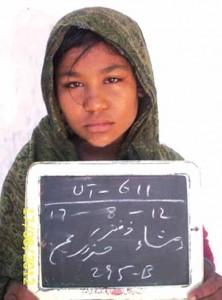LAHORE, Pakistan (Morning Star News) – A court in Islamabad on Saturday (Aug. 17) dismissed charges against a Muslim cleric arrested on suspicion of framing a Christian girl for blasphemy.
Khalid Jadoon, leader of a mosque in the Meherabadi suburb of Islamabad, had been charged with desecrating the Koran and planting false evidence – pages ripped from the Koran and mixed into half-burnt pages of an Arabic-language, prayer-learning book – against 14-year-old Rimsha Masih. With a medical report showing her mental age as younger than her 14 years and the chief justice of the Islamabad High Court calling the charge against her “fake allegations,” Rimsha was acquitted on Nov. 20, 2012; she has since fled to Canada to escape Islamist fury.
Jadoon was acquitted after seven witnesses against him retracted their statements, sources said.
Attorney Tahir Naveed, who had represented Rimsha, told Morning Star News from Sargodha that Jadoon’s acquittal was expected due to poor police procedure and pressure from Islamists.
“The court freed Jadoon because the police failed to assure the witnesses that they would not be harmed,” Naveed said. “Moreover, the trial court judges are also under immense pressure when hearing blasphemy cases.”
Attorneys said police had failed to properly collect evidence in the case and instead relied solely on witness statements. Witnesses had stated that Jadoon added pages of the Koran to a bag of ashes Rimsha was carrying.
Before her case was transferred to juvenile court, initially Rimsha was charged as an adult, in which case the charge of desecrating the Koran would have carried a life sentence, 25 years in Pakistan. Arrested in August 2012, she was kept in a high security prison in Rawalpindi for nearly three weeks before her release on bail after allegations surfaced from residents of her neighborhood that Jadoon had planted false evidence because he wanted to force Christian families out of the area.
Jadoon’s lawyer, Wajid Gillani, told Morning Star News by phone that Islamabad District and Sessions Judge Raja Jawad Abbas had ruled that there was insufficient evidence for a case against his client.
“All the witnesses told the judge that they had been forced by the investigation officer, Sub-Inspector Munir Jaffery, to record statements against Jadoon,” Gillani said. “Jaffery had threatened them that he would involve them in fake cases if they did not heed his directions. The imam is an educated and honorable man, and when I took up his defense, he swore on the Koran that he had not tampered with the evidence. Rimsha Masih did commit blasphemy, but she was absolved of the charges under pressure from the international Christian lobby and media.”
Gillani said that Jadoon had decided not to serve in the area’s mosque after the “humiliation” meted out to him by police.
“My client also fears that Sub-Inspector Jaffery will involve him in more such fake cases,” he added.
Rimsha was arrested after a furious crowd demanded she be punished for desecrating the Koran. She and her family had to go into hiding after her release from jail in September 2012.
The case provoked widespread international concern about the application of Pakistan’s widely condemned blasphemy laws and the status of members of minority religions in the nearly 96 percent Muslim country.
Rimsha was released on bail after Hafiz Mohammad Zubair, a prayer caller at the same mosque where Jadoon was imam, recorded a statement against him before a judicial magistrate in September 2012. In his statement, Zubair said he was sitting in meditation in a mosque in front of the girl’s house when Malik Hammad, the complainant, brought allegedly burnt pages of the Koran before Jadoon. The cleric then added two more pages of the Koran in the evidence to strengthen the case against the Christian girl, he stated.
When Jadoon allegedly included pages of the Koran into the evidence in the polythene bag, Zubair tried to stop him and insisted that only the original evidence against the girl should be offered to police, according to Zubair.
“The cleric ignored my advice and said it would make the case stronger and would lead to the eviction of the girl’s family from the area,” he stated.
Zubair had claimed that at least two other people also tried to stop the cleric from providing false evidence.
Jadoon was arrested on Sept. 1, 2012 after Zubair testified against him before a magistrate. On Sept. 23, Sub-Inspector Jaffery declared Rimsha innocent and charged Jadoon with desecrating the Koran. A report submitted by Jaffery stated that Jadoon had ripped two pages from the Koran and mixed them into half-burnt pages of the prayer-learning book called the “Noorani Qaida.”
The report also stated that Zubair and two other witnesses claimed that they had seen Jadoon mixing pages of the Koran into evidence to strengthen the case against Rimsha, and that there was no evidence or any eyewitness claiming to have seen the girl burning the Islamic texts.
Zubair stated that he was sitting in meditation in the mosque in front of Rimsha’s house when he saw Malik Hammad, a neighbor of the girl and a complainant in the case, bring half-burnt pages of the Koran to Jadoon, who then included them in the evidence against her. Two other witnesses, Khurram Shahzad and Hafiz Mohammad Owais, had also stated to Jaffery that Hammad had brought to the mosque a polythene bag filled with ashes and burnt papers and handed it to them. Shahzad and Owais said Hammad later took the bag from them and handed it to Jadoon, who later tore some pages from the Koran and put them into it.
They reportedly said they objected to the act, but that Jadoon replied, “This will strengthen a case. Now is a good time to get rid of the Christians of this area.”
Later they brought the matter to the attention of Zubair, who also objected without effect, according to Jaffery’s report.
Soon after Jadoon’s arrest, however, all seven witnesses, including Zubair, retracted their statements, saying police had coerced them into implicating the imam in the case.
Moderate Muslim Leader Disappointed
Christian rights activists and Allama Tahir Ashrafi, head of the Pakistan Ulema Council, a body of Islamic clerics, told Morning Star News that Jadoon’s acquittal was disappointing but did not come as a surprise.
Ashrafi, who spearheaded a public campaign in defense of Rimsha, said that the verdict was “a disappointment for people working to promote religious harmony,” and that police and government were to be blamed for Jadoon walking free.
During the court proceedings, Ashrafi repeatedly asked the government to ensure protection for witnesses as Islamic extremists were threatening them with retribution should Jadoon be convicted, but his appeals fell on deaf ears, the head of the Islamic clerics’ council said.
“Three days before the witnesses retracted their statements, an extremist group supporting Mumtaz Qadri, the assassin of former Punjab Gov. Salmaan Taseer, held a rally in Rawalpindi wherein they publicly issued life threats to the witnesses in Rimsha case,” Ashrafi told Morning Star News. “I believe that the police and administration are equally responsible for poor prosecution in the case.”
Rimsha’s case provided an opportunity to raise awareness among Muslims of the misuse of blasphemy laws, and a conviction of Jadoon would have set an example for those who falsely accuse innocent adherents of all faiths, Ashrafi said.
“Unfortunately, the extremist forces have once again proven their might,” he said, adding that neither the courts nor the government had the will or courage to stand up to Muslim extremists.
“During Rimsha’s case, the Islamabad High Court ruled that misuse of the blasphemy laws had brought a bad name to Pakistan and Islam,” he said. “I ask that if Rimsha was innocent and now Jadoon has also been acquitted of the charge, who are the real faces behind this case? Shouldn’t the trial court judge have asked police to unveil the perpetrators of the case? The fact is that everyone fears the extremist forces and are not ready to counter them.”
Religiously charged court cases commonly involve clamoring crowds of Muslims and other pressures coming to bear on lawyers and judges. Christians make up just 2.45 percent of the population, according to Operation World.
Reform
While Pakistan’s blasphemy laws have been criticized internationally on free speech and other grounds, leaders of minority faiths within the country have advocated reform rather than repeal.
Ashrafi claimed there was unanimity among Muslim leaders and clergy of minority religions in Pakistan that the country’s blasphemy laws should not be repealed – and that there was even agreement that those guilty of blaspheming against Islam’s prophet, Muhammad, should be executed as per Islamic law.
“I have a written statement from Senior Bishop Alexander John Malik, the former bishop of Lahore’s Anglican church and one of the most influential Christian clergyman in Pakistan, that people who are found guilty of blasphemy should be executed, be they Christian or Muslim,” Ashrafi said. “The Hindu and Sikh leaders have also given us written statements of support in this regard. However, we are all on the same page that these laws should not be misused to settle vendettas or personal issues.”
The cleric said that moderate Muslim leaders like him were working to encourage Muslims to accept people of minority faiths as equal citizens of Pakistan.
“There should be no discrimination in laws for Muslims and non-Muslims,” he said.
Police have found most blasphemy accusations to be false during investigation, but accusers can make innocent victims suffer months in jail with quick and easy registration of such cases. Of 5,000 cases registered between 1984 and 2004, only 964 people were charged with blasphemy, according to the Pakistani newspaper Dawn. A recent study by the Centre for Research and Security Studies (CRSS) found that from 1953 to July 2012, there were 434 people blasphemy “offenders” in Pakistan, including 258 Muslims, 114 Christians, 57 Ahmadis and four Hindus.
Those acquitted of blasphemy charges also face threats from homicidal vigilantes. Of 52 people extra-judicially murdered after being charged with blasphemy in Pakistan, 25 were Muslims, 15 were Christians, five were Ahmadis, one was Buddhist and one was Hindu, according to the CRSS report.
Rimsha’s attorney, Naveed, has recently launched a Christian political party called the Pakistan Minorities Alliance that will strive for minority rights and work to end misuse of the blasphemy laws, he said.
“A lot of blood has been spilled, and several innocent people have been made to suffer in prison on false blasphemy charges,” Naveed said. “It’s time we made concerted and coordinated efforts to stem increasing intolerance and discrimination in Pakistan.”
###
© 2013 Morning Star News. Articles may be reprinted with credit to Morning Star News.
Morning Star News is a 501(c)(3) non-profit corporation whose mission is to inform those in the free world and in countries violating religious freedom about Christians worldwide who are persecuted for their faith. For free subscription or to make tax-deductible donations, contact [email protected], or send check to Morning Star News, 24310 Moulton Parkway, Suite O # 157, Laguna Hills, CA 92637, USA.
- Rimsha Masih police mug shot.


